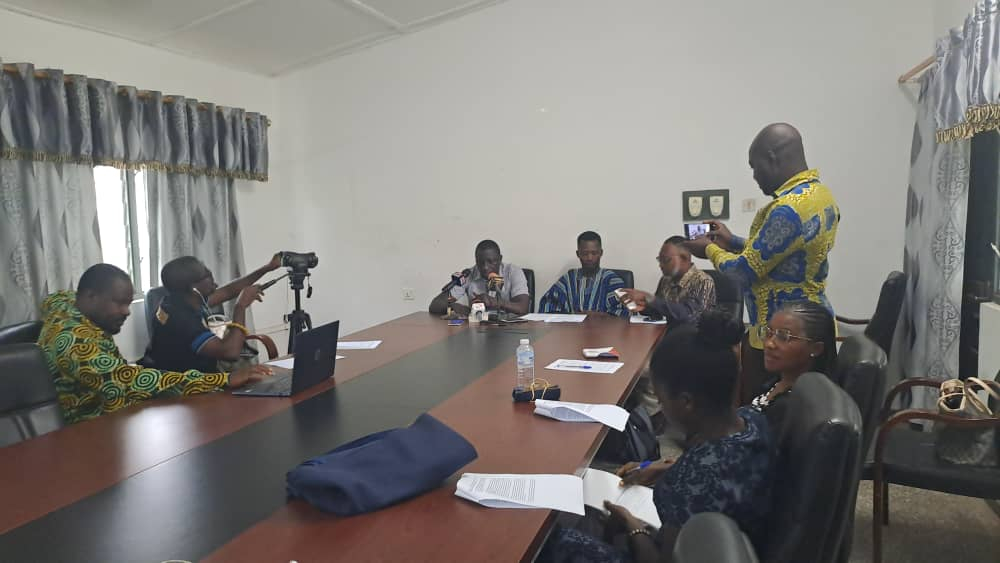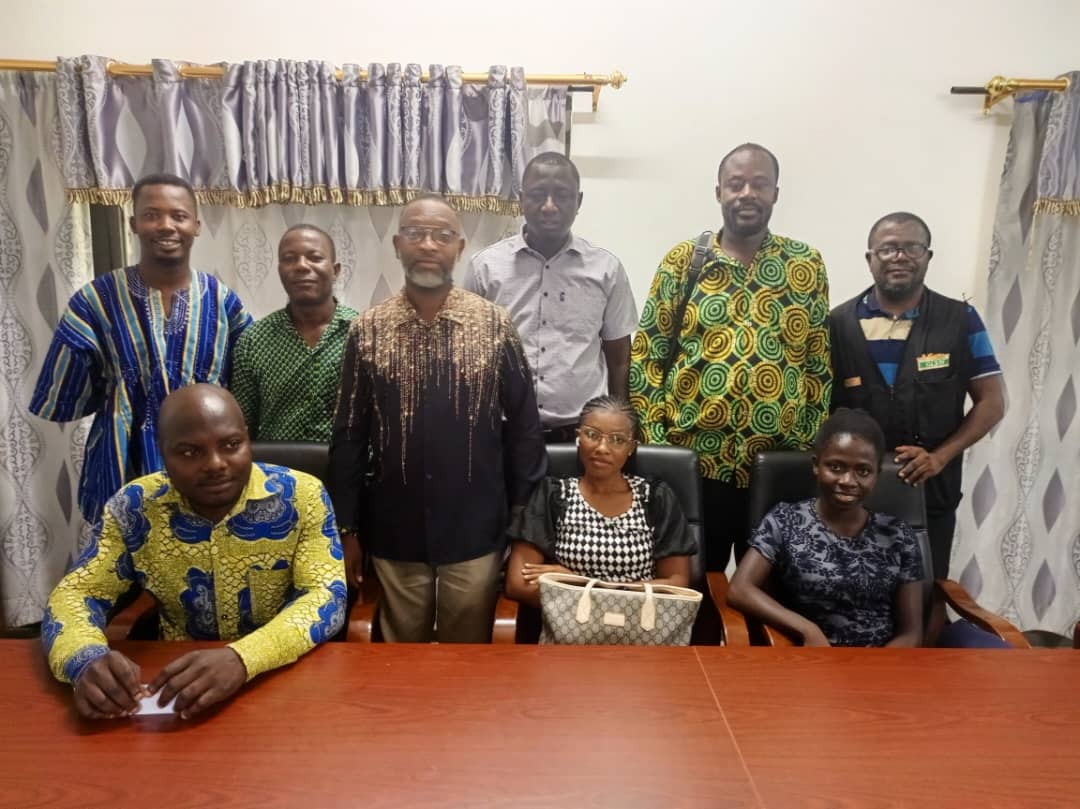This blog is managed by the content creator and not GhanaWeb, its affiliates, or employees. Advertising on this blog requires a minimum of GH₵50 a week. Contact the blog owner with any queries.
As global leaders convene in Kingston, Jamaica, for the International Seabed Authority conference, the Journalists for Responsible Fisheries and Environment (JRFE) urges all African governments to endorse the proposal for a ban, moratorium, or precautionary pause on deep-sea mining.
During a press conference at the University of Cape Coast on Thursday, July 24, 2025, and read by Charles Smith, Co-founder and Partnerships Manager, they emphasized that the deep-sea floor is acknowledged as both a shared human heritage and a site of immense cultural importance, referencing Article 136 of the United Nations Convention on the Law of the Sea (UNCLOS), which designates the ocean floor beyond national jurisdictions as the ‘Common Heritage of Mankind’.
The ocean floor, which has served as a habitat for rare and slow-growing species for millions of years, warrants thorough exploration and exploitation for the benefit of all nations, with particular consideration for developing countries.
JRFE hinted that “after 10 years of negotiations, the International Seabed Authority (ISA) has yet to agree on a regulatory framework and make progress towards acquiring more scientific knowledge about the deep ocean”. Scientists have also not developed sufficient data on deep-sea ecosystems and the potential impacts of deep-sea mining on them to create adequate regulations for their protection. “The regulations cannot precede science,” JRFE stated.

They therefore conclude that to prevent another resource curse, they add their voice to the call for a moratorium or precautionary pause on deep-sea mining and urge the African Union and States to do the same, in order to safeguard the common heritage of mankind and overcome extractive injustice.

Below is the full address:
A press engagement on Deep-Sea Mining by JRFE – delivered by Charles Smith, Development Communications Specialist, Co-Founder and Partnerships Manager at JRFE.
The Journalists for Responsible Fisheries and Environment, JRFE, calls on African governments to stand-up and add their voice to the call on the ban, moratorium or precautionary pause on deep-sea mining as global leaders meet at the International Seabed Authority currently ongoing in Kingston, Jamaica.
The deep-sea floor is recognised as both a shared heritage of humanity and a site of profound cultural significance, beyond serving as a habitat for rare and slow-growing species for millions of years. Article 136 of the United Nations Convention on the Law of the Sea (UNCLOS) describes the ocean floor beyond national jurisdictions as the “Common Heritage of Mankind”, and the 1970 Declaration of Principles Governing the Seabed and Ocean Floor Beyond the Limits of National Jurisdiction (UNGA Resolution 2749) highlights that exploration and exploitation must be conducted for the benefit of all countries, with special consideration for developing nations.
Concerns over unregulated DSM have led thirty-seven countries, along with scientists and environmental organizations, to call for a moratorium or precautionary pause until its risks are fully understood, unfortunately, none of the 37 countries is from Africa.
The findings of the 2020 ISA commissioned study on the assessment of the potential impact of the exploitation of mineral-rich deposits from the international deep seabed area on the economies of countries already engaged in terrestrial mining indicated that eight out of the 13 countries most affected are in Africa, including the Democratic Republic of the Congo, Eritrea, Gabon, Mauritania, Namibia, Zambia and Zimbabwe.
It is against these backgrounds that the continent cannot miss out in adding its voice for a moratorium or temporary pause on deep-sea exploration because implications of Deep-Sea Mining (DSM) go beyond environmental risks to questions of economic justice, traditional/cultural memory, and sovereignty over shared global resources.
Deep-sea mining poses significant threats to abyssal marine ecosystems and carries potentially irreversible damage to fragile habitats and rare species, some of which may take millions of years to recover just as they took millions of years to come into existence.
As critical economic pillars for many African coastal nations, fisheries and coastal livelihoods already face significant vulnerabilities and their stability is essential for long-term prosperity.
Deep-sea mining presents serious risks to fish stocks by altering ocean currents, disrupting seafloor ecosystems and potentially depleting oxygen levels.
After 10 years of negotiations, the International Seabed Authority (ISA) is yet to agree to a regulatory framework and progress towards acquiring more scientific knowledge about the deep ocean. Scientists are frequently telling us there is not enough scientific data on deep sea ecosystems and the potential impacts of deep-sea mining on them to create adequate regulations for their protection. The regulations cannot precede science.
The common saying that we know more about space than we do about the deep seabed remains true to this day, as only 1% of the deep ocean is explored, many deep-sea ecosystems remain poorly understood and even recent studies which bring new information to light have their findings disputed.
Until now, we’ve seen the industry basically justifying deep sea mining by saying that we need these metals from the ocean floor in order to feed the technologies of the green transition, specifically, for example, electric vehicle batteries. But we have seen a huge body of research demonstrating that actually that’s not the case at all, mainly because battery technologies are moving away from the kinds of minerals that are found in the deep sea. In the last few months, we have seen the industry shift away from this narrative because it seems that they are starting to realize that it doesn’t fly. There are rumblings of certain companies potentially targeting these minerals for defence uses-weapons. If that’s the case, and those metals are used for defence and military purposes, it would be totally inappropriate. There are clauses in the U.N. Convention on the Law of the Sea that specify that the common heritage of humankind is supposed to—if it’s used at all—to be used only for peaceful purposes.
The African Union’s Blue Economy strategy emphasizes sustainable use of ocean resources for economic growth, improved livelihoods, and ecosystem health. However, deep-sea mining raises critical issues that must be addressed to align with these objectives. Also, the African Union has no clear legal framework for regulating DSM within national jurisdictions and African states have little representation in international decision-making. There is a risk of resource exploitation by foreign companies, limiting benefits for African nations while increasing environmental risks.
Therefore, to prevent another resource curse, we add our voice to the call for a moratorium or precautionary pause on deep-sea mining and urge African Union and States to do the same in order to safeguard the common heritage of mankind and overcome extractive injustice.


